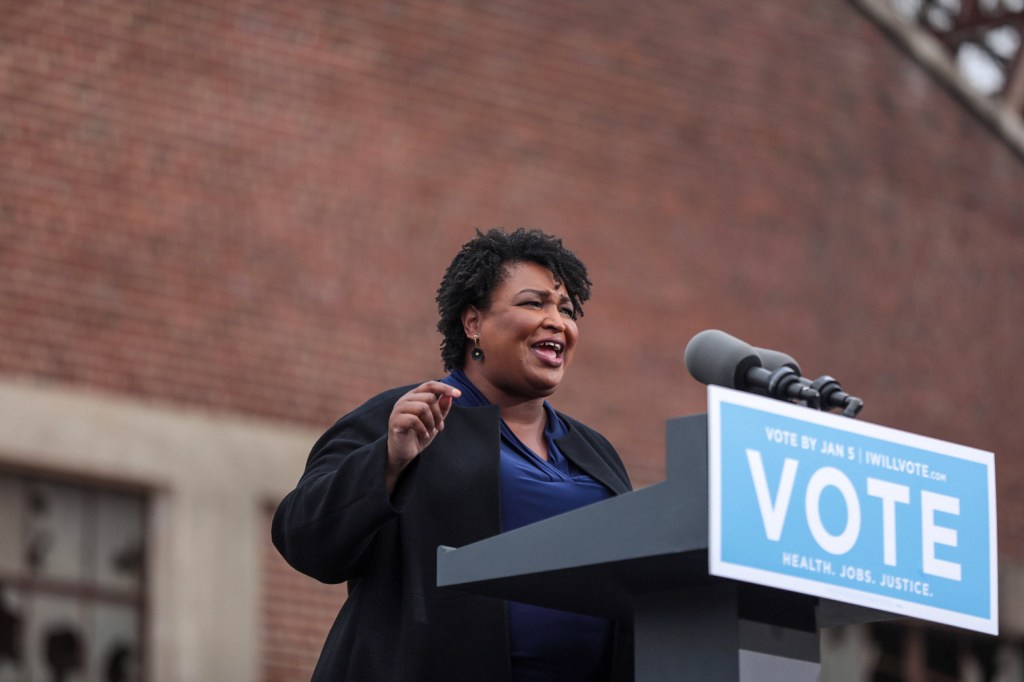Texas joins Alabama, Georgia with new election laws
Published 11:00 pm Thursday, September 9, 2021

- Stacey Abrams, former 2018 gubernatorial candidate, rallies for U.S. Senate candidates Jon Ossoff and Rev. Raphael Warnock on Dec. 15 in Atlanta.
ATLANTA — Texas became the latest state, alongside Georgia and Alabama, to impose new, and more restrictive, voting laws ahead of what is expected to be an intense 2022 election cycle in a fight for Party control.
SB 1 “will uphold the integrity” of the state’s elections and “will make it easier to vote and harder to cheat,” Texas Gov. Greg Abbott suggested on Twitter this past week of the Republican-led bill that mirrors several components of Georgia’s newly enacted SB 202 and Alabama laws that limit the authority of local jurisdictions to expand voting access.
“The passage of SB 1 should be a clarion call for U.S. senators on the urgent need for federal action protecting the freedom to vote,” said Stacey Abrams, former Georgia gubernatorial candidate and founder of Fair Fight Action, a national voting rights organization. “Our U.S. senators must follow the courageous lead of Texas Democrats and answer their desperate pleas for federal action to save our democracy. With the Texas redistricting process looming, U.S. Senate passage of the For the People Act and John Lewis Voting Rights Advancement Act is imperative.”
The state’s new law eliminates overnight early voting hours and drive-through voting, which is reported to have been popular in more Democrat-leaning counties. SB 1 establishes new ID requirements and rules for voting by mail, and imposes criminal penalties for local election offices that distribute unsolicited applications for mail-in ballots, and imposes penalties for those who help voters cast their ballots.
Similarly, Georgia’s voting reform law also now requires an ID for submitting an absentee ballot and prohibits local election offices from sending out unsolicited applications for absentee ballots. Georgia’s law makes it a crime to pass out food or drinks to voters waiting in line, a common practice in areas where hours-long waits to vote have occurred.
Alabama is also among nearly 20 Republican-led states that have imposed new voting laws following the defeat of former Republican President Donald Trump, who falsely attributed his loss to election fraud.
“After November 3, I was the very first United States congressman or senator to publicly state, in my judgement, if only lawful votes cast by eligible American citizens were counted, Donald Trump won the 2020 Presidential election,” Congressman Mo Brooks, R-Alabama, said in a tweet Sept. 3.
The state’s new laws are more restrictive especially as it pertains to absentee voting, requiring voters to state a valid reason for voting absentee in addition to requiring the signature of two witnesses or a notary on the ballot; the state also banned curbside voting.
“There’s plenty of models out there, even in Republican states like Colorado, that have had vote-by-mail for years and years without causing problems other than maybe more Democrats voting and that’s what republicans are scared of,” said Wade Terry, executive director of the Alabama Democratic Party. “You don’t have to look any further than Alabama when in 2020, they gave COVID exemptions where anyone could vote absentee, and what you saw was a record Democratic turn out and that’s scary to Republicans, so they’re going to make it as hard as possible for people to vote, especially people of color and of lower socio-economic status.”
Following the rowdy election year, preceded by a 2013 Supreme Court weakening protections of Voters Rights Act, several states have pushed changes to voting laws. Under one of the now-overturned provisions of the Act, states with a history of racial discrimination were required to get approval from the federal government to change any voting laws. Some of those states included Alabama, Georgia, Mississippi and Texas.
Following the passage of Texas’s SB 1, Sen. Raphael Warnock, D-Georgia, who has co-led efforts to pass the For the People Act — a Democrat-led proposal and update to the Voting Rights Act — urged his colleagues to act on a new federal voting reform bill immediately.
“This is just the latest in a slew of efforts to shut the people out of their own democracy,” Warnock said. “I’ve said it before and I’ll say it again: Congress must pass federal voting rights — no matter what. There is no time to waste.”
The U.S. Senate is expected to convene Sept. 13 and will consider the John Lewis Voting Rights Advancement Act, which passed in the House Aug. 24 along party lines; Senate Republicans last month blocked the For the People Act. The two federal proposals, in general, aim to expand voter access and provide uniform national voting laws, which would override individual state laws.


